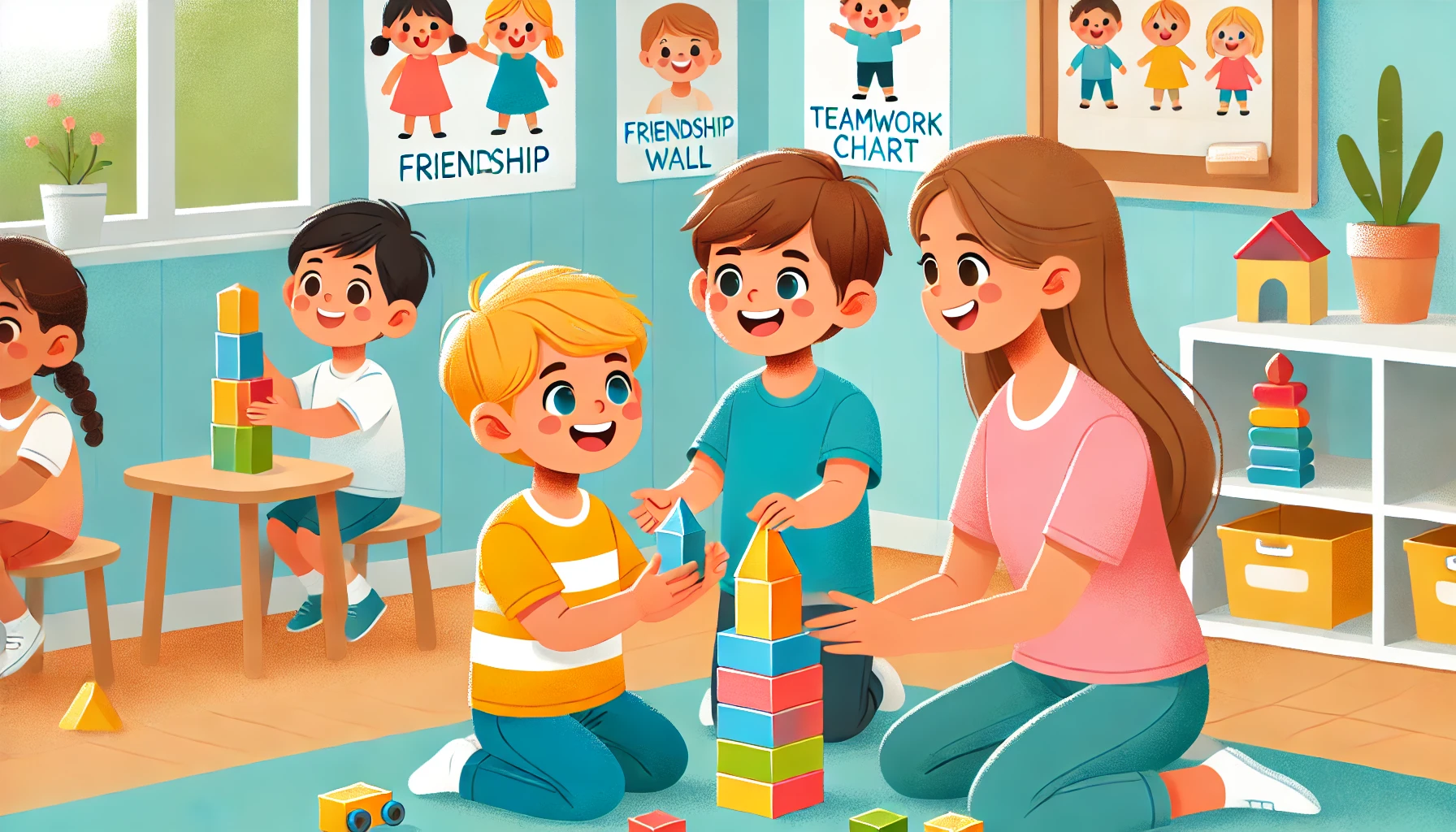How to Teach Young Children About Healthy Friendships and Social Skills
Building friendships is an essential part of early childhood development. Friendships teach children empathy, cooperation, and communication—skills they will use throughout life. While young kids are still learning how to express themselves and understand others, gentle guidance can help them build strong, positive social connections.
Why Teaching About Friendships Matters
- Promotes empathy and emotional understanding
- Develops communication and listening skills
- Encourages cooperation and sharing
- Helps children resolve conflicts peacefully
- Fosters self-esteem and belonging
1. Explain What Friendship Means in Simple Terms
Make friendship relatable.
Activity Idea:
- Say: “A friend is someone you like to play with and who is kind to you.”
- Use examples from their life: “Your friend at daycare who shares toys with you.”
- Ask: “What do you like to do with your friends?”
What Kids Learn:
- Clear understanding of what friendship looks like.
- Recognition of kind and respectful behavior.
- How friendships feel positive and safe.
2. Model Friendly Behavior
Show children what being a good friend looks like.
Activity Idea:
- Share: “I called my friend today to see how they’re feeling.”
- Use friendly language: “Would you like to play with me?”
- Highlight positive social behavior in daily life.
What Kids Learn:
- Friendly behavior starts with simple actions.
- How to invite others into play.
- The joy of connecting with people.
3. Role-Play Friendship Scenarios
Practice builds confidence.
Activity Idea:
- Use dolls or puppets to act out friendly interactions: sharing toys, saying hello, helping a friend.
- Include conflict scenarios: “What if both want the same toy?”
- Reflect: “What can we do to be a good friend in this story?”
What Kids Learn:
- Social problem-solving skills.
- Comfort in managing friendship challenges.
- Positive ways to interact with others.
4. Read Books About Friendship
Stories offer helpful examples.
Activity Idea:
- Read books like A Sick Day for Amos McGee by Philip C. Stead or How to Be a Friend by Laurie Krasny Brown.
- Ask: “What made the characters good friends?”
- Draw pictures of your child with their friends doing kind things.
What Kids Learn:
- Emotional connection to friendship values.
- Recognizing kindness and loyalty in relationships.
- New vocabulary around social skills.
5. Encourage Cooperation Through Group Activities
Teamwork strengthens social bonds.
Activity Idea:
- Build something together, like a puzzle or block tower.
- Play games that require cooperation, like passing a ball or parachute play.
- Celebrate teamwork: “You worked together so well!”
What Kids Learn:
- How to cooperate and listen.
- That working together is fun and rewarding.
- Skills for group environments.
6. Teach Conflict Resolution Gently
Friendship includes learning to solve problems.
Activity Idea:
- Teach simple phrases: “Can we take turns?” or “Let’s find a way to share.”
- Role-play disagreements and solutions.
- Model calm conflict resolution in your own interactions.
What Kids Learn:
- That it’s okay to have disagreements.
- Peaceful ways to handle conflicts.
- How to repair friendships.
7. Praise Positive Social Interactions
Reinforce friendly behaviors.
Activity Idea:
- Say: “You were so kind to invite your friend to play!”
- Use a friendship chart or stickers to celebrate good moments.
- Reflect at the end of the day: “How were you a good friend today?”
What Kids Learn:
- Recognition and pride in positive actions.
- Motivation to keep building friendships.
- Self-awareness in social situations.
8. Create Opportunities for Social Play
More play equals more practice.
Activity Idea:
- Arrange playdates or attend community playgroups.
- Provide toys and games that encourage cooperative play.
- Guide initial interactions if needed, then step back to let kids lead.
What Kids Learn:
- Social skills through real-life practice.
- The joy of building relationships.
- Confidence in group play settings.
Final Thoughts
Teaching young children about healthy friendships and social skills helps them form strong, meaningful connections that support their emotional and social growth. Through play, stories, gentle guidance, and plenty of practice, children learn how to be kind, cooperative friends. These lessons not only enrich their childhood—they lay the foundation for a lifetime of positive relationships.
